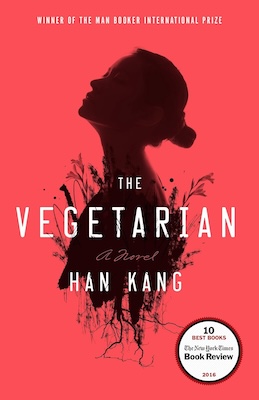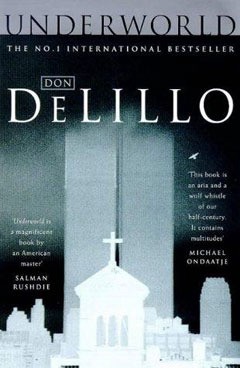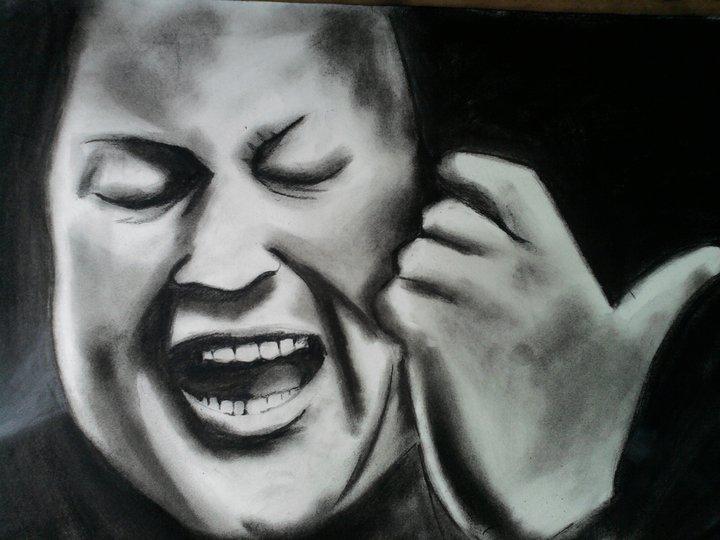essays
The Unsettling Gaze of Han Kang
Discomfort is what she does best

Flesh permeates the work of the novelist Han Kang. Her novel, The Vegetarian, obsesses over it. Unsurprising considering the bulk of the story follows Yeong-hye, who, after a disturbing and bloody dream, becomes a vegetarian. Although a strong Buddhist tradition exists on the peninsula, for most, meat is an essential aspect of Korean cuisine and culture, and reflects Korea’s status as a growing economic power. Besides kimchi, Korean-style BBQ is probably its most recognizable gustatory export, and you can find it from Los Angeles to Yangon.
In the novel, Yeong-hye’s husband is particularly displeased and confused by this sudden conversion. He wonders, “How on earth could she be so self-centered? I stared at her lowered eyes, her expression of cool self-possession. The very idea that there should be this other side to her, one where she selfishly did as she pleased, was astonishing. Who would have thought she could be so unreasonable?” These sentences provide keys to some of the central concerns of the novel beyond that of its title. There’s the inability for a man to comprehend a woman’s interior life that does not revolve around himself (“this other side of her”). The concept of choice in a strictly hierarchical and patriarchal culture (“she selfishly did as she pleased”). Throughout the novel these issues appear over and over as most of those around Yeong-hye find it conceptually impossible to empathize with her.
There is also a deep embarrassment brought on by Yeong-hye’s new choices. Out at a company dinner, Yeong-hye’s refusal to eat meat means his husband loses face as his boss and coworkers marvel at the idea that anyone would choose such a diet. His boss even gives the table the old lecture that “meat eating is a fundamental human instinct, which means vegetarianism goes against human nature, right? It just isn’t natural.” Instead, vegetarianism is associated with ideology, which is of course also part of human nature. But never mind that: Yeong-hye’s vegetarianism simply makes everyone uncomfortable. Her family is no better. Her mother worries, “How can that child be so defiant? Oh, you must be ashamed of her!” while her father, a bellicose, Vietnam vet, screams at her during a catastrophic family meal, “‘Don’t you understand what your father is telling you? If he tells you to eat, you eat!’”
This discomfort accelerates as Yeong-hye’s mental state deteriorates, and becomes the real heart of the matter for Han. Mental health is a particularly taboo subject in South Korea, and, like Yeong-hye’s refusal to eat meat, is another thing that confuses and shames her family. After her dramatic suicide attempt at the family meal, her husband leaves her (no great loss as he spends large parts of the first third novel ignoring her mental state when he’s not raping her), her family is ashamed enough to abandon her; her brother-in-law, who is obsessed with her body, takes advantage of her. Only her sister, who is fearful of what Yeong-hye’s fragile state implies about her own possible downfall, is left to care for her after she is committed.
Discomfort is what Han Kang does best. Her writing is strongest when she makes the reader linger over difficult imagery or ideas that South Koreans are reticent to broach. In Human Acts, Han announces these intentions right from the first sentence: “‘Looks like rain,’ you mutter to yourself.” This second person narration unsettles, instantly dislocating and relocating the reader. We are no longer passive, but are made into actors within her story. Such technique has been deployed recently by other Korean writers, such as Kyung-sook Shin in Please Look After Mom, and although Han does not use it for the entire novel, she slips in and out of it, to jarring effect. Han wants the readers to be actively involved in her story, to feel as if these things are happening to them, something to which we will return.
The “you” in this case is Dong-ho, a sensitive young man caught up in the turbulence of the Gwangju Uprising. He’s no revolutionary, just a middle school student whose best friend, Jeong-dae, was shot during a protest. Trying to find Jeong-dae, or at least his body, Dong-ho arrives at a school gym that has been turned into a makeshift morgue to house many of civilians that Korean army special forces have massacred. Unable to find Jeong-dae, he decides to remain at the gym, helping a young woman named Eun-sook and a energetic, committed man Jin-su to take care of the rotting corpses.
Forgive the digression into history lesson, but it’s important to understand the context of the Gwangju Uprising. It had tremendous bearing on the Korean history that unfolded in its wake, which is Han’s chief focus. The Uprising, like so many attempts by citizens to wrest democratic control from rigid authorities, ended in massacre with nearly 250 dead, though citizens of Gwangju argue staunchly that at least several thousand were killed. The fallout led to years more of stiff repression, disappearances, and anti-democratic rule.
The Gwangju Massacre was the bloody conclusion of a bloody eight months following the October 1979 assassination of president Park Chung-hee at the hands his own security chief and close friend Kim Jae-gyu. Park is principally credited with the economic “Miracle on the Han River”, but was losing his grasp on power as the economy stumbled and citizens grew increasingly weary at Park’s repressive policies. His death left an enormous power vacuum into which strode general Chun Doo-hwan who initiated a coup d’état that December. Chun was described by former US ambassador Richard L. Walker as “one of the shrewdest, most calculating, politically smart people I’ve known” and instituted martial law to crack down on the democracy movement that had been gaining strength in the late ‘70s.
Spring is the traditional protest season, and it was a veritable powder keg in 1980 as anti-government protests surged across campuses, factories, and cities. Chun poured gasoline on this fire invoking fears of that the unrest was being instigated by North Korea. One of his acts was to throw future Nobel Peace Prize winner Kim Dae-jeon back in jail, a move perceived as especially incendiary to the people of Gwangju, the rebellious city from whence Kim hailed. Chun unleashed the military on the city with disastrous results as domestic press was suppressed while pitched battles, indiscriminate beatings and killings, and massive protests ground the city to a halt. At one point citizens repelled the army, which withdrew to the edges of the city where they licked their wounds and planned their revenge. This thin glossing of events1 gets us to to the beginning of Han’s tale.
It is better not to think of Human Acts as a novel. Rather it’s Han’s reckoning through literature with the tremendous sorrows of recent Korean history.
Dong-ho’s responsibilities in the ersatz morgue involve ministering to the corpses as they decompose in the cool dimness of the gym and showing them to families seeking loved ones. This leaves lots of time for Dong-ho to consider this situation. He’s confused, as any teenager might be having witnessed his own police and military beating old men in the streets and shooting his closest friend. Why, for example are the protesters singing the national anthem or shrouding the corpses in the Taegukgi (the flag of South Korea)?
Han’s second person narration makes this atmosphere overwhelming, and more than once I became aware of how I was forcing myself to continue to slog through these descriptions of flesh:
Every time you pull back the cloth for someone who has come to find a daughter or younger sister, the sheer rate of decomposition stuns you. Stab wounds slash down from her forehead to her left eye, her cheekbone to her jaw, her left breast to her armpit, gaping gashes where the raw flesh shows through. The right side of her skull has completely caved in, seemingly the work of a club, and the meet of her brain is visible. These open wounds were the first to rot, followed by the many bruises on her battered corpse.
Because Han inserts readers into the narrative so explicitly, she seems to be directly addressing those responsible for Gwangju, asking that those who perpetrated these crimes walk in the shoes of those they so brutalized. Chun Doo-hwan, for example, still lives, while Park’s daughter is now the South Korean president. She has been courting controversy recently by proposing public schools use government approved history textbooks that opponents say may whitewash Gwangju and its aftermath. Such a state makes Han’s book even more important as the country continues to struggle to confront these lingering griefs.
At one point we (that is Dong-ho) speculate, “There are no souls here. There are only silenced corpses, and that putrid stink.” This foreshadows Han’s second innovation in perspective which is to plunge us into the point of view of Jeong-dae’s soul, trapped in a pit of rotting corpses dumped outside the city.
At first Jeong-dae is confused, “No one had ever taught me how to address a person’s soul before.” But Han doesn’t let us rest easy. She confines us in this new entity’s panic as it works out the strange logic of incorporeality. “I thought of my sister, only of her. And I felt an agony that almost broke me. She was dead; she had died even before I had. With neither tongue nor voice to carry it, my scream leaked out of me in a mess of blood and watery discharge. My soul-self had no eyes; where was this blood coming from, what nerve endings were sparking this pain?”
Slowly, Jeong-dae coomes to accept this new state of being as he begins to realize the metaphysical implications of “I wasn’t Jeong-dae anymore, the runt of the year. I wasn’t Park Jeong-dae whose ideas of love and fear were both bound up in the figure of his sister.” This chapter is a unique meditation on the finality of death and includes some of the most poetically alive passages in the novel.
However, it’s the aftermath that Han is especially interested in. She wants to know how these momentous, and still taboo events, that led Dong-ho to that gym and into the fray of these larger events shaped the lives of the survivors. As we move forward through time, Han paints vignettes of Jin-su, Eun-sook, Dong-ho’s mother and several other characters all interconnected by the boy’s tragic, dually meaningful and meaningless death.
Han prefers plunging readers directly into moments, while maintaining a tone of matter-of-factness. She’s not interested in building context from the outset. Instead she sends us forward and back through her characters’ memories. Eun-sook’s chapter, for example begins, “At four o’clock on a Wednesday afternoon, the editor Kim Eun-sook received seven slaps to her right cheek. She was struck so hard, over and over in the exact same spot, that the capillaries laced over her cheekbone burst, the blood trickling out through her torn skin.” Violence and mystery combine with Han’s flat tone to reflect the loneliness that pervades the lives of Gwangju’s survivors.
A friend of Jin-su’s begins his story in a similar tone, “It was a perfectly ordinary biro, a black Monami biro. They spread my fingers, twisted them one over the other, and jammed the pen between them.” Han makes state brutality a banal affair, full of visits to the censor’s office and methodical, senseless torture. These are things that make it so difficult to for its victims to cope with. As Eun-sook recollects of post-Gwangju, “Life was a constant skirmish”. Han’s characters are tired and harried by their memories, which seem always return to Dong-ho, to that moment in the final day of the Uprising when the soldiers seemed to exert brutality just because they could, exacting their revenge at losing face to a rag-tag bunch of idealists.
It is better not to think of Human Acts as a novel. Rather it’s Han’s reckoning through literature with the tremendous sorrows of recent Korean history. She wants to unmask the darkness that surrounds South Korea’s meteoric rise into the world of the OECD and bilateral free trade agreements, give voice to the multitude who struggled against repression, whose lives were irrevocably altered, often not for the better. There is little redemption for her characters, and Human Acts, like its predecessor The Vegetarian, does not make for cheery reading. This works well because these acts result in scars that will never fully heal. Human Acts jumps around, from character to character, testing out points of view; it’s restless, always seeking answers where there are few obvious ones. Han is left with the small acts of people trying to maintain what little dignity wasn’t stolen from them by a government that is in many ways intact, still operating on policies that stifle citizens and protect the state. Dong-ho’s mother perhaps sums this up best, saying “The thread of life is as tough as an ox tendon, so even after I lost you, it had to go on.”
- Anyone interested would do well to begin with Dan Oberdorfer’s account in The Two Koreas (Basic Books). Han Kang also provides several essential texts she used while researching the novel. ↩︎










